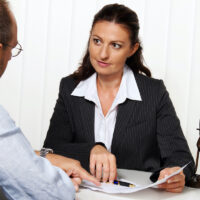Questions Expert Witnesses Need to Be Able to Answer at Deposition/Trial

Providing an expert opinion in a legal matter is about more than applying scientific principles to facts. The expert witness must be willing and able to withstand heavy questioning and extreme scrutiny from opposing counsel during a deposition and while testifying at trial. Below, we cover several of the most important areas of questioning an expert witness is likely to face at deposition or on cross-examination. If you need expert opinions and testimony for your medical malpractice or personal injury litigation, call a qualified medical expert witness at Neurosurgery Medlegal Services, LLC for assistance.
Education, Experience, and Qualifications
Experts must be qualified in the area of scientific or technical expertise governing their opinion in the matter. Experts must be prepared to defend their education, explain their qualifications, and demonstrate their real-world experience in the relevant area. If the expert has a mistake on their CV, if there is a gap in their experience, or if their field differs too greatly from the area at issue in the case, the expert’s credibility could be undermined.
Concerns Regarding Bias
Any attorney worth their salt will try to portray the opponent’s expert as biased. Bias undermines the jury’s confidence in the expert’s conclusions by suggesting they had ulterior motives. Experts should be prepared to answer questions relating to possible bias, including prior case history (do they always testify for the same side), the fact that they’re being paid for their opinion, any connection to the party in the case, etc. The attorney offering the expert should practice cross-examination concerning any and all areas of possible bias.
The Opinions
It goes without saying that the expert must be prepared to state their expert opinion; that’s what they were called to do. But they must be ready to field challenges on every aspect of that opinion, from the facts they used to the methodology, what research they performed, what resources they utilized, their degree of certainty, the specific language they chose to use, etc. Any time opposing counsel can trip up an expert about their own opinion, that witness loses credibility in the eyes of the court and the jury.
Methodology Used to Reach Their Conclusions
An expert must be prepared to explain in clear detail the methodology they used to reach their conclusions. Which scientific or technical principles were employed, what peer-reviewed sources indicate that those principles are valid and apply in this instance, how were those principles applied to the facts in this case, and other similar questions are likely to arise. If an expert is unable to properly explain what methodology they used, how they did so, and why those methods are scientifically valid, the court might throw out that expert’s opinion.
Fee Issues
It’s standard for opposing counsel to grill any expert about their fees. What fees are they being paid, if they are “large” fees, why are they justified, do those fees affect their opinion, etc. Experts must be prepared to answer these questions simply, directly, and without appearing defensive.
Prior Publications, Opinions–Especially if Contradictory
Any prior published statement or opinion of the expert may come into play. Experts should be prepared to defend prior statements, or explain why they are not relevant to the case at bar. A question about a publication from 10 years ago about something entirely unrelated to the case may be objected to as irrelevant, but if the expert’s position has since been debunked, or that position directly contradicts what the expert is saying in the instant case, the witness had better be prepared to deal with that issue.
Contradictory Facts from Elsewhere in the Case
Expert witnesses should be given a general overview of the case and should be given all of the facts necessary to generate and produce an opinion. Experts are not expected to have an encyclopedic knowledge of the entire case, especially insofar as other parts of the case do not impact their area of expertise or their proffered opinion. However, if there are other facts in the case that contradict the expert’s opinion on a given issue, they must be made aware of those facts and be prepared to explain how those facts can be separated from their opinion.
If you need a poised, skilled, and effective expert witness in a personal injury, medical malpractice, or product liability case, contact the offices of Neurosurgery Medlegal Services, LLC, at 866-659-8051.
